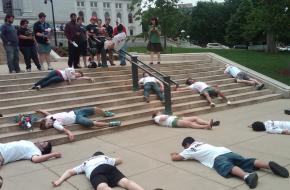Learning from Walkerville
and report from Madison on protests, big and small, that Wisconsin activists have organized against Gov. Scott Walker's budget attack.
THE MAKESHIFT tent city along the side of the Wisconsin Capitol building in Madison--dubbed Walkerville--is going strong at the close of its first week as activists prepare new plans for action to protest Republican Gov. Scott Walker's budget.
Inspired by the protest encampments of Spanish activists and taking its names from the famous Hoovervilles of the poor during the Great Depression, Walkerville got its start on June 4 when activists who were part of the mass demonstrations against Walker's union-busting legislation and the occupation of the Capitol in February and March returned to the scene of the struggle
The tent city is meant to be a base camp for a series of activities to protest the austerity agenda Walker has pushed through since taking office--which reached a new low with a budget proposal that slashes away at programs that many poor and working Wisconsin residents rely on.
On Monday, June 6, union members and community activists descended on Madison's downtown for a march on the square that swelled to 1,000 people at its height. Contingents came from the many unions and activist organizations that planned the protest, including the firefighters union, Madison Teachers Inc., National Nurses United, Family Farm Defenders, Union Cab, Wisconsin Resists and many others.

As this article was being written, activists were preparing to confront Walker and U.S. Rep. Paul Ryan, an architect of the GOP austerity agenda on the national level, at a conference at the University of Wisconsin-Madison Business School.
Activists planned for other days to be devoted to educating the public on specific issues at state in this struggle. So June 7 and 8 were focused on two of the most prominent points of attack by the state: health care and higher education.
WALKER'S BUDGET plan would slash state Medicaid spending by $466 million over the next two years. This will shift a heavy financial burden on Wisconsin's most vulnerable health care patients and will force many families to go uninsured. Some 1.2 million people--about 20 percent of the state's population--rely on BadgerCare and other public health care programs, and stand to lose considerably.
Plus, in an attack on women's reproductive rights that has become all too commonplace around the country, the Joint Finance Committee voted last month to block state and federal grants to Planned Parenthood, amounting to a $1 million cut.
On "Health Care Day" at Walkerville on June 7, protesters staged a series of actions to voice their opposition to these attacks.
The day began with music by the Raging Grannies and a performance by the "Theatre of the Oppressed" that acted out what will happen if Walker's attacks on health care are passed.
Later, the union coalition We Are Wisconsin staged a light-hearted "boxing match" at Walkerville, with health care programs facing off against corporate greed--activsts representing BadgerCare, SeniorCare, nurses and others who will be hurt by the cuts beat up on Republican lawmakers like Sens. Alberta Darling, Luther Olson and Dan Kapanke, plus Walker himself. About 150 people attended the event and listened to speeches by local labor activists after each "round."
There was a heavy emphasis on the upcoming recall elections that seek to replace six Republican senators, including Darling, Olson, and Kapanke. Unfortunately, the labor officials' focus on these recalls has demobilized grassroots action against Walker and the Republicans. And even if they succeed, there is no guarantee that Democrats, who have shown around the country that they are also willing to carry out austerity, will restore the cuts and rescind the anti-union measures.
The budget attack on working people is also being carried out on the front of higher education. The University of Wisconsin system faces a $250 million budget reduction in the next two years, including a $94 million cut from UW-Madison, the state's flagship institution. The effects of these cuts will be devastating: higher teacher-to-student ratios, decreased financial aid packages, the flight of higher-profile faculty members and increased tuition.
The cuts, coupled with the recent voter suppression bill that restricts the rights of many Wisconsinites, including college students, has left many students feeling like they are "as good as dead" in the eyes of the legislature. Recognizing this reality, more than 50 citizens of Walkerville organized a "Zombie March" on the Capitol on June 8 as part of a day focused on the issue of higher education.
Wearing shirts reading "Students are as good as dead," demonstrators in full zombie-makeup could be found lying "dead," strewn across the Capitol building steps. After a brief eulogy to commemorate the death of the public university model and students' voting rights, the zombies "re-animated" and lurched into the Capitol building, where a smaller number made their way into Republican Sen. Robin Vos' office, where they once again laid "dead" until police removed them.
The residents of Walkerville have renewed the struggle for social and economic justice in the state of Wisconsin, and they don't mean to put out their campfires anytime soon.


